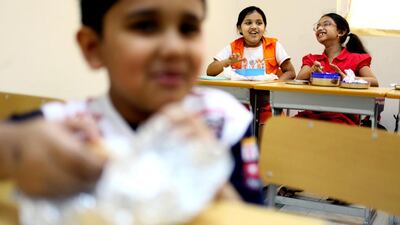DUBAI // Schools all over the country have been ordered to follow strict new health and nutrition guidelines for school meals in a bid to tackle childhood obesity.
The new rules came into affect from the start of the new term, and Dr Wafa Ayesh, director of clinical nutrition at the Dubai Health Authority, said: “All schools must ensure they follow detailed guidelines to ensure suppliers and school canteens provide healthy foods.
“The move is to ensure all children across government and private schools are provided with nutritious food that is needed for their growth and well-being and so that children inculcate healthy eating habits early on.
“The DHA is part of the ‘UAE School Specification for Healthy Foods Committee’ that has worked extensively to implement guidelines across schools.”
The committee is made up of experts from the DHA, Ministry of Health, Ministry of Education, Dubai Municipality, and Health Authority Abu Dhabi as well as universities.
Inspectors working on behalf of the committee will visit schools to ensure they are abiding by the rules to provide healthy, good quality meals and snacks.
Diet experts and doctors welcomed the announcement as a step in the right direction for child health.
“The basic advice is to eat a healthy and balanced diet and ensure that the child eats different groups of food,” said Dr Anita Das Gupta, clinical dietician at Burjeel Hospital. “Give children fruits and vegetables in a variety of colours.
“Eating the fruit is much better than having a fruit juice. Many children consume packaged juices which is not good.”
The new guidelines cover everything from the nutritional value of food, its colour, the additives and preservatives it contains, down to its wrapping, transportation and storage, said Dr Ayesh.
“We have put into place guidelines every step of the way, from the time the food is produced until it is consumed. If there are only fruits, juice and water available to children as snacking options, they will find them appealing.”
As well as serving good food, the rules also encourage schools to keep pupils involved in regular exercise, stating that no child is allowed to substitute a physical education class for any other subject, unless for medical reasons.
“Nutrition and physical activity go hand-in-hand, and during the formative years children need to adapt to this lifestyle so that they will grow into healthy adults who value the importance of exercise and nutritious eating,” said Dr Ayesh.
Soha Noufal, head of nutrition unit at Dubai Physiotherapy and Rehabilitation Centre, said schools rely on parents to help instil good physical exercise habits in children from a young age.
“It is a known fact that children imitate their parents, so as the new academic year begins it’s time for parents to set good examples by exercising themselves. Families can take part in exercise activities together, this helps create a positive association towards exercise and well-being.”
One of the most important ways to encourage healthy eating patterns is to educate children about food and to take into account their likes and dislikes, said Mariam Al Shamsi, head of nutrition education unit at the DHA.
“An innovative menu every week that has been planned and reviewed with your children will make lunch boxes more fun,” she said.
“Taking them grocery shopping is a good activity and will create positive reaffirmation towards food. It is important to encourage them to have a nutritious breakfast every morning, even if this means waking up earlier. Breakfast on-the-go is a habit that should be discouraged.”
Aside from being good for pupils, the food served in canteens must be sensibly priced, said Abdelrahman A Nimeri, director of the Bariatric & Metabolic Institute at Sheikh Khalifa Medical City, Abu Dhabi
“Schools need to provide reasonably priced healthy options in the cafeteria,” he said.
It is not the first time the DHA has focused on improving the eating habits of schoolchildren. Last year the DHA carried out a healthy lunch box campaign across 80 private and government schools in Dubai targeting more than 5,000 children.
malkhan@thenational.ae
* Additional reporting by Anam Rizvi

